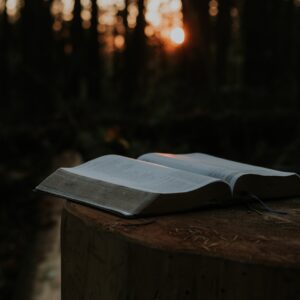I like to walk for exercise and stress release. My normal walk is about 3 miles. I live in the country, so the road is quiet and weaves among woods and fields. It rises and falls. It reminds me of life. There are highs and there are lows. There are parts of the journey that are easy (like those flat stretches!) and there are parts that push my lungs and my legs. There is one particular spot; I love it on the front end of the walk because it is a nice downhill. But the return trip puts it halfway home when I’ve already walked 2 miles. When I get close, I keep my eyes focused just a few feet in front of me. I don’t want to look at the long-range view of that hill. My lungs are in overdrive and a side stitch is building. The hill and the next few steps seem insurmountable. (OK, maybe that’s a bit dramatic; but tell that to my labored breath and burning legs!) It is at this moment that I turn around and walk backwards. You heard me right. I walk backwards.
In Deuteronomy 6:20-25, Moses shares: “20 In the future, when your son asks you, “What is the meaning of the stipulations, decrees and laws the LORD our God has commanded you?” 21 tell him: “We were slaves of Pharaoh in Egypt, but the LORD brought us out of Egypt with a mighty hand. 22 Before our eyes the LORD sent signs and wonders—great and terrible—on Egypt and Pharaoh and his whole household. 23 But he brought us out from there to bring us in and give us the land he promised on oath to our ancestors. 24 The LORD commanded us to obey all these decrees and to fear the LORD our God, so that we might always prosper and be kept alive, as is the case today. 25 And if we are careful to obey all this law before the LORD our God, as he has commanded us, that will be our righteousness.”
Deuteronomy is Moses’ last five sermons. Moses will not be entering the Promised Land with his people; God will only show it to him before he dies on Mt. Nebo. Moses was keenly aware that Israel must never forget its history. The word “Deuteronomy” is “eleh ha-devarim” in Hebrew, which means “these are the words.” In Ancient Greek, it is “Deuteronomion” meaning “second law” or “a copy of this law.” The book is a refresher course, so to speak; a reminder of the covenant God made with His people, how they are to live, and His faithfulness.
It was important for the Israelites to remember where they came from and the miracles and provision of God. It is no less important for us to remember the countless times our Father has carried us. Rescued us. Comforted us. Encouraged us. Tested us. Delivered us. Loved us. Oh, how He loves us! For if we forget our personal history with the Father, Son, and Holy Spirit, we limit our future.
When things are difficult and challenging. When we feel pushed to our limit physically, emotionally, spiritually, we only need to turn around and walk backward. Look at where Jesus has brought you. Look at how far you’ve come. Look at what you’ve overcome. Look to the Father who has walked each and every step with you. Every hill and every valley. It is His breath in your lungs. It is His grace propelling you forward.
So at mile 2, I look back. With each step I take, I trust God to move me forward while showing me how far we’ve come together. And the more I walk, the easier the hill gets. By the time cold weather returns, that hill won’t challenge me like it does right now. God will have reminded me of what I can do in Him and with Him. He will have equipped me with all I need to climb the hill and enjoy the view.
“Heavenly father, thank you for the journey. The hills and the valleys. The wind and the rain, the sun and the warmth. Let us remember that we never walk alone. Remind us that you not only walk with us, but have walked before us. Let us find peace in the hills as much as in the valleys. And let us look back with gratitude and celebrate how far we’ve come.” In the precious name of Jesus. Amen.
How can you trust God with your hills? Look back and see how far He’s brought you.

I love your metaphor of your walks and journey. It really is important to remember how far we have come. “Only by the grace of God go I.” Thank you, Rhonda, you write as if I was walking with you.
Thank you so much!!